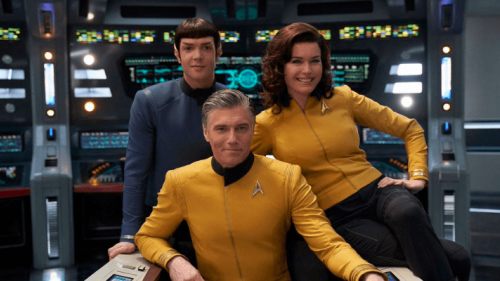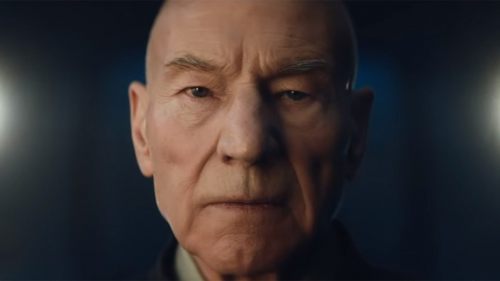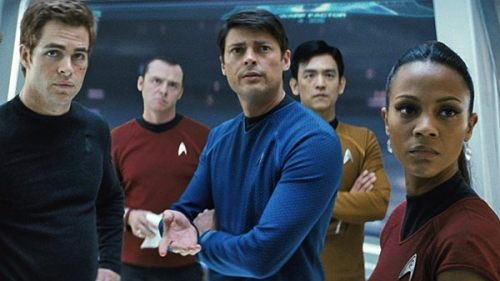When Franchises Refuse To Move Forward
What is the most recent chronological event in the Star Trek universe? Forget canonically-questionable spin-off literature, flash-forwards, or visiting time travelers. On-screen, what was the last new event?
If you said Captain Riker taking command of the USS Titan and Picard befriending Data-like android B-4, then you have correctly identified 2002’s Star Trek: Nemesis as both the furthest most point in Trek chronology and the film with the silliest robot name. Since 2002 we’ve had three new films and two new TV series, yet they’ve all chosen to take several steps backward and return to the familiar trapping of the past.
Star Trek is not the only franchise to retreat after glimpsing its own shadow. Over the past 20 years there have been four films featuring proper noun Aliens, and yet 1997’s Alien: Resurrection remains the most recent event in this universe. In both instances, time comes to a screeching halt and we’re left to explore what’s been and gone. We’ve seen the future, and the future is past.
Many long-running franchises seem caught in a particular type of arrested development. The future is a scary place, as the events of the past couple of years have proven, and it’s natural to want to return to a place of warmth and comfort.
Before we throw the entire concept of the prequel under the bus, let’s take a moment to examine what it means. (A cursory glance around the internet for “best prequel” initially proves that a remarkable number of people fail to grasp what the word “prequel” means. Or the word “best”.) So let’s start with the godfather of all prequels, The Godfather Part II.
The Godfather II works in large part because it tells two stories in parallel: the continuing adventures of Michael, and flashbacks to the rise of Vito. The prequel scenes are couched within a sequel, and the two stories complement one another. It’s why all the attempts to re-edit the Godfather series chronologically never took hold as the preferred editions: the order in which the information is presented is important. Chronology isn’t necessarily the best way.
Outside of The Godfather, the prequels that work, or at least feel necessarily timed, are the ones that illuminate a surprising twist. It’s important we enjoy the mystery of Darth Vadar’s reveal, of Laura Palmer’s killer, of the Norman Bates’s secret, of the beach on that apes planet, before we see the events that led up to them. Whether we need to see them at all is in the eye of the beholder, but the order cannot be disputed.
When a series such as X-Men begins by hinting at a long-standing relationship between its two antagonistic leads, it is bait that is all too easy to take when searching for a new franchise direction. As well-received as the X-Men prequels have (mostly) been, they have had to break and bend continuity with their predecessors, and therefore no longer service a story we know.
Franchises predicated on time travel create an interesting problem. Terminator is a story built upon looking backwards, and yet each attempt to push the franchise into a new area has fumbled. It’s telling that the original films were told from the point of view of the people in the past, and the latest attempts have focused on those who travel back. We are no longer a people living in the present, fearing for time travelers from the future; we are now those travelers, desperate to return to a time of safety and right the errors before they happen.
So, as we watch Rogue One and anticipate Solo and nervously log rumours of Young Bobba Fett and Mid-Life Obi-Wan, we have to ask: why can’t we move forward?
It seems likely that these are as much creative choices as business decisions. “A return to the good old days” is as appealing a marketing concept as it is for filmmakers returning to the title that made them a star, or fans now in charge of the franchises they grew up on.
The first half-season of Star Trek: Discovery has now ended, and it’s difficult to identify why it needed to be a prequel series in the first place, given that both aesthetically and narratively it is an awkward and clumsy fit between Enterprise and TOS. The makers of the series seemed unable to explain their choice beyond the unsatisfactorily mathematical “we found a gap in the chronology”.
Perhaps they didn’t like being saddled with 24 season and 13 movies worth of backstory, but that seems like less of a narrative burden than being constricted by those stories waiting in your future. Knowing that all of this takes place prior to the adventures of Kirk et al means waiting for a variation of the inevitable memory wipe trapdoor, the bane of all prequels.
Although great storytelling is often born of constraints, the particular constraints of serialized prequels feel unnecessarily antithetical to a story all about discovery. The trade-off is the nostalgia factor, the promise of a literal return to the good old days. Endings are inherently sad, and large swathes of pop culture has found a way to avoid them. When we watch a prequel we know from the outset what the ending is, and it’s a place we already know and love.



